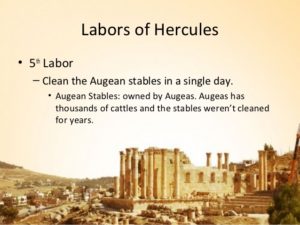 Voters living within the Houston ISD catchment area on November 8th face a “Scylla and Charybdis” vote – and it’s not Clinton vs. Trump – but rather equally terrible public school funding choices.
Voters living within the Houston ISD catchment area on November 8th face a “Scylla and Charybdis” vote – and it’s not Clinton vs. Trump – but rather equally terrible public school funding choices.
What’s happening in Houston gives Texans everywhere an insight into a complex problem with no easy solutions, as Glen Read the general manager of budgeting and financial planning for HISD explained to me in a conversation recently.
A “yes” vote on the ballot question in Houston will authorize “the board of trustees of Houston Independent School District to purchase attendance credits from the state with local tax revenues,” which means sending an estimated $162 million from the state’s largest school district to a state education fund, known as the Foundation School Program (FSP). It also means future payments from HISD in increasing amounts in future years, as Houston’s property values increase.
A “no” vote – barring legislative intervention this Spring – triggers something that has never yet happened in Texas, which is to separate commercial properties from HISD’s tax rolls and assign them to other school districts. Like I said, neither of these choices feels good.
 It’s also an opportunity – albeit a painful one – for Texans to learn more about a financing system which the Texas Supreme court in their May 2016 ruling named “Daedelean,” “Byzantine,” “Augean,” and an “ossified regime ill-suited for 21st Century Texas,” while simultaneously declining to over-rule previous legislative decisions.
It’s also an opportunity – albeit a painful one – for Texans to learn more about a financing system which the Texas Supreme court in their May 2016 ruling named “Daedelean,” “Byzantine,” “Augean,” and an “ossified regime ill-suited for 21st Century Texas,” while simultaneously declining to over-rule previous legislative decisions.
These upcoming payments from HISD have been mislabeled “Robin Hood” and “recapture.” But “Robin Hood” is a terrible nickname for this upcoming process, for two reasons, having to do with the definition of “wealthy” and for the specific meaning of “recapture.”
First, labeling HISD a “wealthy” district is odd. The “wealthy” designation that triggers HISD’s payment comes from a math formula – specifically the ratio of total real estate property values to student population, with a few adjustments to the population number for attendance rates plus specific student designations. The “wealthy” label does not take into sufficient account a measure that seems more important to me, like the fact that 76 percent of HISD kids are designated “economically disadvantaged.” Robin Hood – the mythical man in tights – did not after all make a habit of stealing from the poor.
Second, also unlike our mythical Robin Hood that “recaptured” money does not necessarily get redistributed to poorer school districts. Now, this is the point where Texans everywhere should sit up and pay special attention. Right here. Ready?
HISD’s “recaptured” money goes into the state’s primary education fund – the FSP – but that money is not doled out subsequently to poorer districts. This is the key point. The math ratio of property value to student population determines which districts pay money in to the FSP and which districts take money out of FSP, but none of that determines whether the state, as a whole, allocates sufficient money to the FSP. In fact, as property values rise locally – and you, the taxpayer, pay more – you’re not really funding your local district, or even the poorer districts. You are relieving the state of the obligation to pay more for education. More money into the FSP from higher property values means less the state has to pay. That’s the finance trick you need to know.
And that’s really nice if you’re trying to save money at the state level, but not exactly Robin Hood-style redistribution, nor a great plan for funding great public education.
For these reasons, The Houston Chronicle editorial page has twice urged a “No” vote, and which would trigger either the never-before-enacted property-tax-separation method or daring the state legislature to try something different before July 2017 – when property rolls would shifted. To be clear, a “No” vote is a sort of game of financial chicken between the voters of Houston and the state, with unknown consequences.
We can do what we usually do about this type of thing, which is to shut off our brains in order to take comfortable refuge behind pre-existing ideological prejudices, and take potshots at the other side’s idiocy. But if you are under the impression that you could start a conversation about school finance with “All we need to do is…” then you are mistaken. This subject does not admit of easy solutions.
Hacking our way intelligently through the overgrown jungle of public school finance, we have to hold a number of contradictory thoughts in our head simultaneously. For what its worth, my process goes like this:
- The socioeconomic background of an individual student appears to affect student outcomes far more than funding-levels-per-student at a school or district. As a result, poor performance at poor schools and higher performance at wealthier schools can persist indefinitely, despite roughly equal funding-levels per student. “Social reproduction” – or a society with little economic mobility – can’t be undone easily by throwing more money at the problem.
- And yet, just giving up on the idea of economic mobility – our hope that poorer kids have a chance to get ahead in life through a combination of hard work and a good education seems – I don’t know, what’s the word? Maybe: Un-American?
- When we talk about public school finance in Texas, really what we’re talking about is educating poorer kids: 59 percent of kids in Texas public schools overall are classified “economically disadvantaged.” The school districts subject to ballot questions that I’m writing about this week and next week, in the Houston and San Antonio ISDs, educate 76 and 92 percent economically disadvantaged kids, respectively.
- To which I conclude that we can’t fix this quickly with more money, or by simply equalizing scarce resources, but at the same time, to not try to improve it some how, some way, some day is to resign ourselves to a bleak future of haves and have-nots with no end in sight.
I have no so lutions. I’m just trying to educate myself on one of the most complex finance problems out there.
lutions. I’m just trying to educate myself on one of the most complex finance problems out there.
I can see that the HISD ballot question is a terrible choice to make.
A version of this ran in the San Antonio Express-News and Houston Chronicle
Please see related post
The San Antonio ISD ballot question (upcoming)
Post read (158) times.

